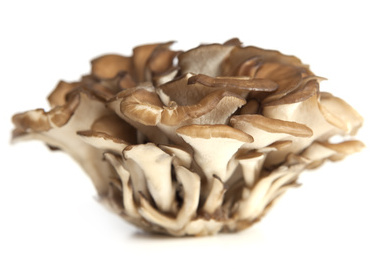Health Benefits of Maitake Mushroom
By Irina Bright.
 Maitake mushroom.
Maitake mushroom.
Maitake mushrooms are commonly known by their Japanese name, and refer to the Grifola frondosa species of fungus, which is native both to Japan and North America.
Maitake are just one of those wonderful medicinal mushrooms which have gained a big popularity around the world thanks to their outstanding health-boosting properties. (Ref. 1)
To start with, maitake are rich in healthy nutrition and contain a wide array of vitamins, minerals, amino acids, potent polysaccharides and other essential nutrients. (Ref. 2 and 3)
Maitake are also a known adaptogen. (Ref. 4)
This means that when we go through a lot of stress, chemical compounds in maitake work to protect our system from potential damage and restore the body's functions to their optimal levels - i.e. "adapt" it to changes.
This adaptogenic function of maitake mushrooms may also be related to them having a modulating effect on the immune system. (Ref. 5)
When our immune system is over-active, maitake will calm it down; when it is under-active, they will try to encourage it to work better. Thus, maitake will attempt to bring the immune system *back into balance* naturally.
Other mushrooms which are similar to maitake in their adaptogenic and immunomodulating actions are reishi and shiitake. Learn more about these alternative mushrooms here:
These properties of reishi, shiitake and maitake mushrooms are believed to help with fighting cancerous cells as well. (Ref. 6)
Maitake's anti-oxidant capacity fights free radicals and protects the body from oxidative stress. (Ref. 7)
Maitake mushrooms are known for their pleasant taste and are widely used as a culinary ingredient. Take them on their own, add them to food or mix them with other superfoods.
Written by: Irina Bright
Original publication date: 2013
Updates: 2020
Republication date: 2020
References.
1. A. Ganeshpurkar, G. Rai, and A. P. Jain (2010). Medicinal mushrooms: Towards a new horizon. Published in Pharmacognosy Review. Retrieved June 4, 2013 from: https://www.ncbi.nlm.nih.gov/pmc/articles/PMC3249912/
2. USDA Agricultural Research Service, National Agricultural Library, Nutrient Data Laboratory (2013). Nutrient data for 11993, Mushrooms, maitake, raw. Release 25. Retrieved June 4, 2013 from: https://ndb.nal.usda.gov/ndb/foods/show/3583?fg=&man=&lfacet=&count=&max=25&sort=&qlookup=maitake&offset=&format=Full&new=1
3. Hong Lin, Elisa de Stanchina, Xi Kathy Zhou, Feng Hong, Andrew Seidman, Monica Fornier, Wei-Lie Xiao, Edward J. Kennelly, Kathleen Wesa, Barrie R. Cassileth, and Susanna Cunningham-Rundles (2010). Maitake beta-glucan promotes recovery of leukocytes and myeloid cell function in peripheral blood from paclitaxel hematotoxicity. Published in Cancer Immunology, Immunotherapy. Retrieved June 4, 2013 from: https://www.ncbi.nlm.nih.gov/pmc/articles/PMC3268513/
4. Jos A. Olalde Rangel, Meyer Magarici, Francis Amendola, and Oswaldo del Castillo (2005). The Systemic Theory of Living Systems. Part IV: Systemic Medicine-The Praxis. Published in Evidence-Based Complementary and Alternative Medicine. Retrieved June 4, 2013 from: https://www.ncbi.nlm.nih.gov/pmc/articles/PMC1297512/
5. Jong Suk Lee, Su-Young Park, Dinesh Thapa, Mi Kyoung Choi, Ill-Min Chung, Young-Joon Park, Chul Soon Yong, Han Gon Choi, and Jung-Ae Kim (2010). Grifola frondosa water extract alleviates intestinal inflammation by suppressing TNF-a production and its signaling. Published in Experimental & Molecular Medicine. Retrieved June 4, 2013 from: https://www.ncbi.nlm.nih.gov/pmc/articles/PMC2827831/
6. Frenkel M, Abrams DI, Ladas EJ, Deng G, Hardy M, Capodice JL, Winegardner MF, Gubili JK, Yeung KS, Kussmann H, Block KI (2013). Integrating Dietary Supplements Into Cancer Care. Published in Integrative cancer therapies. Retrieved June 4, 2013 from: https://www.ncbi.nlm.nih.gov/pubmed/23439656
7. Thekkuttuparambil A. Ajith and Kainoor K. Janardhanan (2007). Indian Medicinal Mushrooms as a Source of Antioxidant and Antitumor Agents. Published in Journal of Clinical Biochemistry and Nutrition. Retrieved June 4, 2013 from: https://www.ncbi.nlm.nih.gov/pmc/articles/PMC2275760/